This article has been reviewed according to Science X's editorial process and policies. Editors have highlighted the following attributes while ensuring the content's credibility:
fact-checked
trusted source
proofread
New study uses gene prediction tool to select premium grade Angus herds

Ranches across the Show-Me State manage approximately two million cattle—a significant number of which are Angus, a top-tier breed that has unrivaled success in the commercial beef market. In a new study, University of Missouri researcher Jared Decker and Thompson Research Farm tested a group of commercial Angus cows using a commercial genomic prediction tool called Zoetis GeneMax Advantage to investigate the ability of the test to predict their calves' performance and profitability.
This project demonstrates an important step forward in helping inform the selective breeding of commercial cowherds and giving Missouri cattle producers a competitive market advantage.
While testing a sample of commercial Angus females and their offspring at MU's Thompson Research Farm, Decker found significant relationships between the cows' genetic merit and the performance of their calves. For the study, researchers focused on specific traits, such as weaning and carcass weight, marbling, fat, and ribeye area.
"In prioritizing the use of this technology, Thompson Research Farm recently harvested a set of 35 steers, 70% of which graded prime, the highest quality grade that the Department of Agriculture (USDA) ranks meat," said Decker, Wurdack Chair of Animal Genomics in the College of Agriculture, Food and Natural Resources. "Compared to the industry, which grades Prime at a rate of 6%, this is really excellent."
Decker believes this success stems from the technology that makes genomic predictions possible. In practice, DNA testing allows farmers to select better cows and refine the herd with good genetics on top of good management. As a specialist in the ways technology can streamline farming practices, Decker sees it as his calling to help producers corner the market.
"It's a goal of mine to help producers innovate in ways that get them closer to harnessing a competitive advantage in this market," Decker said.
"I want to help them adopt new technologies like DNA testing and genomic prediction. For a while now, we've had historical data on the performance of calves in terms of growth and carcass performance. So, a key goal of this study was to demonstrate to farmers, ranchers, extension professionals, veterinarians and academics that this technology does, in fact, work. There is a significant relationship between calf performance and the cow's genetic merit."
Although genomic prediction has a legacy of success in seedstock cattle—purebred animals with documented pedigrees—this is the first time it's shown to work in a sample of commercial cattle.
For Missouri's beef industry, a leading driver of state revenue, genomic prediction technology represents an opportunity for growth, both for producers and the economy.
"Genomic prediction tools allow farmers to go from not knowing the pedigree or any of the animal's performance data to taking a DNA sample and receiving a very accurate prediction as to the heifer's genetic merit," said Decker, explaining that this technology opens doors for commercial producers to be more aggressive in selecting the right females to go back into the herd. "This gives farmers a chance to make informed decisions that enhance sustainable profitability."
For family run farms, genomic prediction technology is not only affordable, but also provides opportunities for small operations to document calf crops that boast superior genetic score cards. This allows farmers to either hold on to the calves through their feeding period and make a greater profit off their carcass merit or to market the weaned calf at a premium based on their first-rate genetics, instead of at typical commodity prices.
"Farmers and ranchers really value this lifestyle; they value the family tradition," Decker said. "That family tradition gives them the grit and the fortitude to deal with really challenging circumstances like drought or low prices or whatever the present big challenge is. So, helping them think strategically about how to create the best calf crop is something that will serve them and keep those family farms profitable."
The research is published in the journal Livestock Science.
More information: Brian.C. Arisman et al, Evaluation of Zoetis GeneMax Advantage genomic predictions in commercial Bos taurus Angus cattle, Livestock Science (2023). DOI: 10.1016/j.livsci.2023.105266
Provided by University of Missouri




















